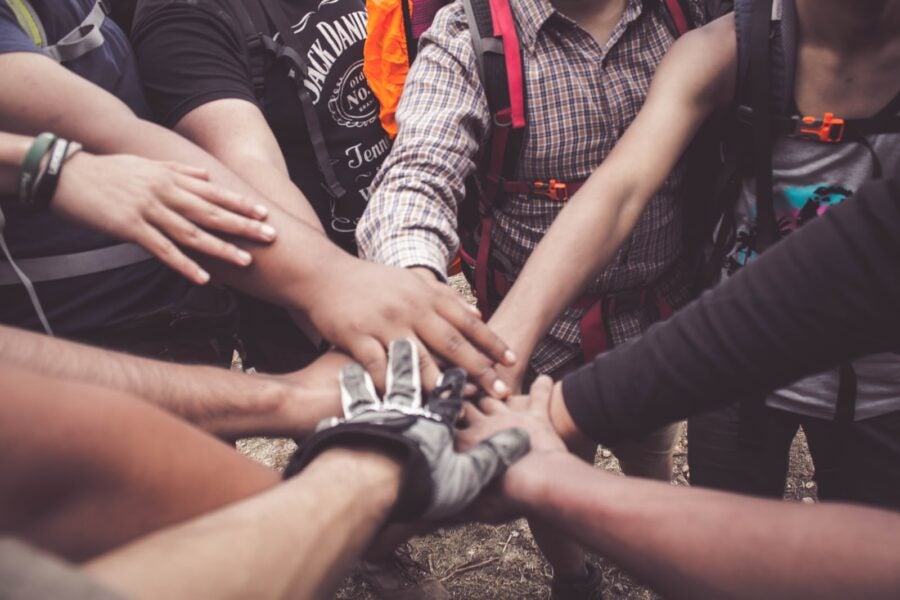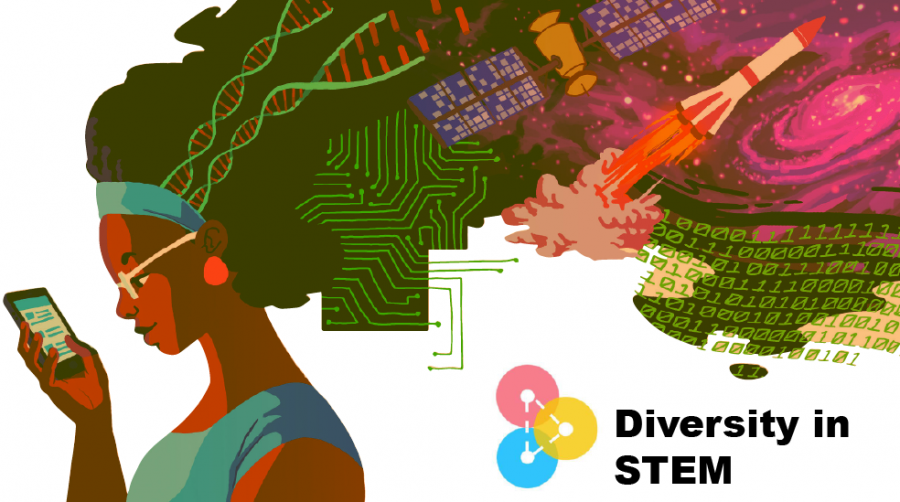Written by: Aiyana Emigh
Edited by: Keith Fraga
Note: Interwoven into this article are parts of an interview held on Feb 12th with Alexus Roberts, third-year PhD candidate in Population Biology, who was one of the lead organizers for the Diversity in STEM Conference.
In the midst of university controversy over the valuation of faculty diversity statements in their application process, the students of UC Davis held their newly-expanded, annual Diversity in STEM Conference (DISC) on January 25th with the purpose of “[honoring] the progress that has been made towards diversity and inclusion on campus, in the industry, and beyond.”
Me: How well did the events of the day meet your mission? Did you achieve everything you wanted to achieve?
Alexus: I think based on our mission and our purpose statements we were talking about bringing together marginalized students to create community… and [talk] about the barriers to marginalized students and how you overcome them. I think the panel alone addressed that. And then, honoring the progress that has been made on campus… those are really broad goals. We definitely addressed them but I think we have to collect feedback from people [over the next] couple years and … see if that [led] to internships or job opportunities. I think as a committee one of our goals is to create a pipeline for marginalized students to graduate from higher education on their own terms… That [will take] time.
Held in the ARC Ballrooms and filled with more food than everyone could eat, the day began with breakfast and time to mingle before sitting down for the first speaker. After splitting a cinnamon roll with the keynote speaker, Dr. Renetta Tull, because we both had a craving we didn’t want to indulge, I sat down to listen to a very inspiring morning of speeches and panel discussions.
Dr. Tull’s keynote address “Joy in the Journey” outlined the meandering path she took to her current position as Vice Chancellor of Diversity, Equity and Inclusion. The title was inspired by a quote from Representative Ayanna Pressley of Massachusetts, “It’s alright to stand in joy…joy is a necessary act of resistance.” It was very clear from her talk that Dr. Tull intimately understands the mental health concerns of graduate students and personally experienced the bias and discrimination women and minorities face, especially within the STEM community, and wants to be an ally to current students who may be struggling.
Her story highlighted that success may not always look like we imagined it to and we may need to rethink our trajectory, but if we focus on the problems that are important to us we can find our way. One part Dr. Tull shared that stuck in my mind was a section of a poem she wrote on her flight home from a speaking engagement on diversity in Latin America:
I am out of the box,
the voice you didn’t know you needed to hear,
together we are better,
join me in the struggle to lift others up.
This consistent message throughout her story was the need for resilience, mentorship, and community. “[Reshaping] environments [people exist in] can mean something. It can inspire.” We need to choose to surround ourselves with people who are going to build us up.
Me: What did you enjoy most about the day?
Alexus: There was a certain point during the luncheon where I had to go up [on stage] and tell everyone … ‘here is what’s happening.’ And just seeing everyone out there talking, smiling and laughing, seeing them lining up to talk to the panelists–it was really cool. [The DISC Organizers] are really making a difference and making a space for community … [and] connections.
This message of community was echoed throughout the remaining morning sessions. Two panels – “Transitioning from College to the Workplace” and “Navigating the Workplace in STEM” – consisted of four speakers* each plus the lead panelist and moderator, Dr. Devin Horton. I could fill up several pages with the stories, advice, clarifications, solidarity and support the speakers packed into this hour, but to sum it up through quotes by the panelists:
- “Don’t measure by how much help someone appears to need.” –Lakshmi Sharma
- “The system is not fair and you have to find ways to change it, but don’t let it compromise your mental health.” –Colleen Bronner
- “There is so much [we] don’t know and don’t realize. Mentors can help you figure out how prepared you are.” –Gwladys Keubon
- On dealing with imposter syndrome, adopt the attitude: “I don’t know it yet, but I will.” –Amanda Dang
- “Resources may have been there but not the knowledge of them or the thought I deserved them. Have the confidence to go after them. Move the resources closer to you.” –Barbara Blanco
- “My culture tells you to be humble and that if you put your head down and work someone will notice you. This doesn’t work. [We need to] encourage people who are doing well and give them the opportunity to be leaders. Doors open up from achievements but also from advertising them.” –Carlos Gonzalez
- “Always be willing to learn and grow no matter what position you are in.” –Linda Finley
- “The reimbursement system is b***s***.” –Crystal Rogers
An important distinction made during this time that I don’t think is discussed enough is on the difference between mentors and sponsors. A mentor helps you through advice and support. A sponsor advocates for you, even when you aren’t in the room. During the Q&A, one student attendee spoke about his struggle with finding a sponsor. The response: Sponsorship requires trust; Invest time in them, in who they are and their personality. The truth is that these sponsor-sponsee relationships are investments and, when networking, the number one piece of advice someone can give you is to find what you can do for your sponsor. It’s not just about what they can do for you. Demonstrating what you can do for the sponsor and your developing relationship with them will encourage the sponsor to advocate for you when you are not in the room.
Me: What challenges did you face?
Alexus: Everyone [who was planning this event] is a student. So making sure that we actually made time for all of this was difficult. I definitely know there was a good two weeks when I got back from winter break where I didn’t focus on anything else besides this conference. We had already been planning since June, but [this] was the time when everyone needed updates … Additionally, [the organizers] are strong visionaries and leaders … and when you have [many of these people] in a room together, there is a lot of back and forth about how we [wanted] things to be––making sure that everyone was happy with how this looked can cause tension sometimes. The last thing was student turnout. We had 100 students come which was incredible. And all the students that were there really gave some high praise and admiration for the conference overall. But, to put in all that work and have 100 of the 200 that RSVPd not show up was [frustrating]. I think people are busy but if you are involved in planning an event then, you know, that handful of people not showing up is difficult.
Another important discussion graduate students need to have is on the balance between hard work and mental health. So many students come in and acquiesce to professors’ expectations or demands, or they don’t feel like they have the right to pursue their interests outside of their lab work. Complicated by a power imbalance and centuries of tradition, the relationship between PI and student can be wonderfully supportive and productive but it can also be very contentious.
Also asked in the Q&A was how to bridge the gap between working hard and maintaining mental health. The response: Taking care of yourself improves your work. Set boundaries and priorities, and commit to your hobbies. Most importantly: Learn to say no. “No” is a complete sentence. This advice should be given to every graduate student walking on to campus and will continue to be relevant as we move on in our career. Women and minorities are often asked to contribute more of their time on average to serve on committees and be present because of these efforts to diversify. This means the people often struggling hardest to stay afloat are the same people with more pressure and responsibilities.
Me: One point brought up in the panels was how people may have access to resources but didn’t know they were there. What are your thoughts on trying to make all the resources known to people, whether on campus or in general?
Alexus: I think it’s difficult because we have all these different mediums to connect with students and make sure that what you have to offer is out there. The people providing the resources… have to do their part to advertise it and make it accessible to people… I know it can be very overwhelming to try to look for all those things and when you are struggling it is very hard to be like ‘I can go and I can do this thing.’
After the lunch break and conversations with the interesting women at my table, we split up for an afternoon of workshops. There were three options for each of the two workshop sessions divided into two tracks: graduate and professional. For my first session, I attended the “Conflict Management” professional track option led by two student interns from the Center for Leadership and Learning which began with an exercise where we individually chose four words that we associated with the word “power.” I chose (1). Money, (2) Politics, (3) Corruption, and (4) Confidence. We then paired up and were tasked with narrowing down our combined eight words back down to four by advocating for more of our words to be included in the final set than our partner’s. Then, our pairs combined with another group and repeated the process but this time arguing for more of the other group’s words to be included in the final set. This activity was accompanied by debrief questions about what it revealed about your approach to conflict and was followed up by a quick conflict management style assessment similar to the one linked here that assigned an animal (I’m an owl apparently) to different approaches to conflict. The last session before the career fair, ”Stories from Professionals,” consisted of guest speakers talking about their career paths and experiences. Their advice reiterated many points made during the morning panels but could be boiled down to: reach out and make as many connections as possible. Not only do opportunities open when you meet new people but it exposes you to differing viewpoints that improve collaboration and broaden your perspective.
Me: What did you find disappointing about the conference?
Alexus: From a little feedback from people, making sure that this is useful for graduate students. All the undergrads really seemed to enjoy it, but I want to make sure we are serving the general UC Davis student body. So, making sure that the people we are inviting to lead our workshops are aware that we have grads and undergrads. [However,] I think Dr. Tull’s keynote speech and the panelists really addressed everyone.
To close the day, there was a career fair composed of several industry sponsors plus a few departments and campus resource centers. The room felt lively with conversation but I couldn’t help but notice the lack of diversity in the organizations attending – nearly all were engineering-based. I don’t happen to be personally interested in working in industry (although I did stop by the US Army Corps of Engineers booth to say hello since my dad and uncle worked for them for forty years) so I gravitated towards speaking with the representatives from the departments and resource centers. I mostly spent time speaking with the wonderful Nicole Rabaud, the Director of Graduate Academic Programs for the College of Biological Sciences. We spoke for nearly an hour about the state of graduate education (and more specifically my biophysics graduate group) and pathways for influence and reform. A few important reminders inspired by our conversation: (1) there are several exciting science policy fellowships opportunities in Sacramento including CCST and Capital Fellows, (2) Aggie Compass is available 24/7 for helping meet your basic needs, and (3) A “Buy Nothing” Facebook group exists for the Davis area.
Me: Will you be doing it again next year? If so, what will you be changing?
Alexus: Yes, we are meeting [soon] to talk about next steps and plans for next year. We are looking to make DISC an actual organization. Having people focused just on DISC will be good. This year, we had the presidents of all of the organizations that were involved be the representatives on the committee. I was with ESTEME and also [focusing] on DISC as well, which means that often something else had to go. It’s not like we could drop off [the responsibility to] our clubs. So, for me, that was my research sometimes.
Overall, I really enjoyed the day and I look forward to attending this event next year. The DISC conference is a great celebration of the diversity of people in STEM at UC Davis and an important reminder about the value of community.
*There was a substitution not indicated on the website in the first panel of Blen Kelleni for Gwladys Keubon.


